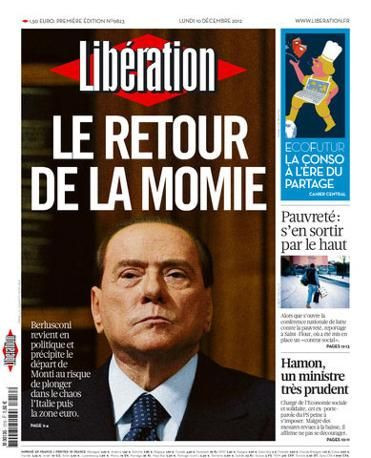'Return Of The Mummy': Berlusconi Appalls Europe, Again

There he is again, on the front page. Silvio Berlusconi had been away from the European political limelight for a year, after being ousted in November 2011 as Italian prime minister and replaced by the technocratic cabinet led by Mario Monti. Political journalists across the Continent let go of the jokes on bunga-bunga parties, and focused on his successor's arduous task: Could Monti heal Italy's economy, left in tatters by two decades of near-uninterrupted rule by the flamboyant media tycoon?
That's all over now. Berlusconi announced on Saturday that he is coming out of retirement to run in next year's election; his party has withdrawn support for Monti's national-unity cabinet, forcing the prime minister to resign; and Europe is faced with the possibility that one of its key countries may be run again by a 76-year-old man convicted of tax fraud and being prosecuted for allegedly patronizing an underage prostitute.
Enough for the French newspaper Libération to splash on its front page on Monday a headline that simply said "The Return Of The Mummy," in capital letters, above a picture of a grim-faced Berlusconi.
Other European newspapers reacted in a similarly appalled fashion, especially in Germany, where business daily Handelsblatt called him derisively, in Italian, a pappagallo ("parrot"), and Spiegel Online kept the avian theme with "scarecrow." An editorial in London's Times said his return would be "a disaster for Italy (…) and for Europe."
The press isn't alone in blasting Berlusconi. The speaker of the European parliament, German Social Democrat Martin Schulz, commented on Monday that "his return can be a threat to Italy and to Europe," because "Berlusconi is the opposite of stability."
Granted, Berlusconi and Schulz have a feud. But the reasons for that clash explain very well what it is that the European Union fears about Berlusconi, besides the risk that more of his financial mismanagement will finally sink the euro.
Berlusconi compared Schulz to a Nazi concentration camp guard, in a speech at the European parliament in 2003. (He was displeased at how Schulz had described him earlier.) That breach of Europe's biggest political taboo -- you don't mention Nazis to a German, period, especially not to a politician, and especially not to a Social Democratic one -- put Berlusconi completely beyond the pale. He never recovered.
The many gaffes that came next were just icing on the cake. He broke centuries of diplomatic protocol by keeping German Chancellor Angela Merkel, his host, waiting on the red carpet while taking a phone call. He later called her an unprintable vulgar sexual slur, unaware that he was being taped. He called Barack Obama "young, good-looking and tan," and assailed the journalist who asked him whether perhaps an apology to the American president was in order. He became the laughingstock of the entire continent for his unseemly, spectacularly tasteless bunga-bunga parties, involving dozens of young women, some of whom he then appointed to his cabinet or had elected to parliament. His right-hand man was sentenced to nine years in prison for being a Mafia associate.
But what had already killed Berlusconi in Europe was that evocation of the Nazis. By cavalierly bringing up the ghost of the very monster that the European Union was created to exorcize, he proved without a doubt -- in front of the assembled European political establishment -- that he was unfit to lead one of the Union's largest countries and founding members.
Europeans have learned never to count Berlusconi out. He has been left for politically dead before, for example in 1994, when his first cabinet collapsed. But he has always come back, and has been prime minister for longer than anybody else in postwar Italy.
This time, though, his chances of taking power again are slim. A poll by the Italian political site Scenari Politici has him below 16 percent -- enough to possibly have a say in who becomes the next prime minister, but not enough to catapult him back to power.
Berlusconi and his minions have always counterattacked with the argument that journalists and prosecutors are biased against him, and may even be part of some kind of international conspiracy against Italy.
But then there are the markets, which don’t have an agenda. And on Monday the markets spoke clearly: The Milan stock exchange's FTSE MIB index dropped 2.2 percent, the most among the major European exchanges. The spread between yields on 10-year Italian bonds and the benchmark 10-year German bonds rose to 351 basis points, signaling a loss of confidence in Italy's government. Yet the shares of Mediaset (BIT:MS), Berlusconi's media holding company, rose 2 percent -- as if to say that the markets know that Berlusconi isn't doing this for the good of his country, but for the bottom line of his businesses.
© Copyright IBTimes 2024. All rights reserved.






















